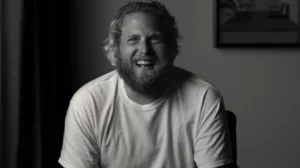Stutz (2022) review
Dir. Jonah Hill
By: Steve Pulaski
Rating: ★★★½
May God, another higher power, or the Tools themselves help Dr. Phil Stutz’s secretary, whose phonelines will probably be inundated with calls, both legitimate and phony, for months on end following the release of this documentary.
That said, it’ll speak to the power of Jonah Hill’s latest film, Stutz, which profiles his longtime therapist Phil Stutz. Conducted like one long therapy session, the two kind souls lay bear their fears, vulnerabilities, and foibles to one another (and the world) in hopes to gain some revelations — or confidence, at the very least — about the lives they’re trying to lead.
Jonah Hill has been remarkably open about his struggles in his own headspace. Earlier this year, he announced he would not be publicly promoting any of his upcoming projects, for fear of anxiety attacks. He’s somebody who grew up being “the overweight kid,” and then got typecast at such a young age that his insecurities not only enriched him but were put on display for the entire world to poke and prod. Hill has been seeing Stutz regularly for an upwards of five years. Your first thought of him making a project like this might lead you to question the vanity behind it. After all, therapy sessions are meant to be personal, contained, and strictly for your betterment as an individual. To edit and broadcast them seems like the work of a narcissist.
But Hill is anything but, and it doesn’t take long before his intentions are validated as noble. He uses his platform, and Stutz, to further destigmatize therapy. He also allows us the practice of working on one’s self with the help of a licensed professional with the same methods that have helped him. In doing so, he offers us, the viewers, an affordable option; one that won’t run the rate of what Stutz likely charges per hour.
Within the few minutes of meeting Phil Stutz, you just know he’s not some self-help Instagram influencer out to get clicks and follows. A New Yorker to his core, the 74-year-old MD is an amusing ballbuster and an even better therapist. He frequently teases Hill for “dumping all this shit” on him. When Stutz asks if he’s ever brought up Cain and Abel, Hill asks if he went to high school with them. The two have this brotherly rapport that makes the 96 minutes of Stutz fly by in what seems like a fraction of the time.
The first 25 minutes of the documentary is a little rough, namely because Hill is vocally resistant about inviting himself and his personal experiences into the narrative. He wants this project to be about the captivating teaching of Stutz — which are known as “Tools,” or mental exercises that allow a person the capabilities to alter their thinking and frame-of-mind. As a result, Hill resists the urge to offer any revealing anecdotes, despite Stutz practically begging for them to be revealed. After this wonky push-pull, Hill reveals the façade of the production (admirably, in a sense of authenticity, I’ll add) and takes a sigh of relief. From there, it feels like the movie actually begins.
Without revealing too many of Stutz’s Tools — I ultimately want you to watch the movie, after all — I will recount the basic principles on which they’re built. The first is a “life force pyramid,” which has three levels: a person’s relationship with their physical body, their relationship with people, and their relationship with themselves. It’s during this chapter that Hill talks about his struggles with weight, and how he wished that diet and exercise were encouraged factors as opposed to people (including his mother, friends, and doctors) simply saying that his weight was a problem, weaponizing his his physical self against his mental self.
Another foundational concept of Stutz’s practices are the three guarantees of life: pain, uncertainty, and constant work. The latter is in regards to the constant work that needs to happen on an individual level for one to be their best, most productive, and satisfied self.
When watching Stutz, I couldn’t help but find myself naturally transfixed by his exercises. Often I’d find myself closing my eyes, or at least partaking in the exercises in which he was leading Hill. There’s a comforting quality to this film. It’s a form of self-help in the way that doesn’t try to sell you anything during or after the fact. There’s no title-card with a link to Stutz’s website. You wouldn’t even know the guy is the co-author of a book or hosts a virtual introductory class unless you did that research on your own.
I’ll add that the segment on “loss processing” helped me quite a bit. Oh, how I wish my late mother, who died last year, could’ve seen this film. Perhaps she would’ve read Stutz’s book I would’ve bought her, had I known of him during her lifetime. Perhaps she would’ve stumbled upon a takeaway or two she could’ve applied to her everyday life. Perhaps she’d still be here today, even though that might be a reach. Instead, I’m left to try and better myself with some of these practices. And I don’t think I’ll be the only one either.
NOTE: Stutz is now streaming on Netflix.
Directed by: Jonah Hill.
About Steve Pulaski
Steve Pulaski has been reviewing movies since 2009 for a barrage of different outlets. He graduated North Central College in 2018 and currently works as an on-air radio personality. He also hosts a weekly movie podcast called "Sleepless with Steve," dedicated to film and the film industry, on his YouTube channel. In addition to writing, he's a die-hard Chicago Bears fan and has two cats, appropriately named Siskel and Ebert!



Fantastic review!